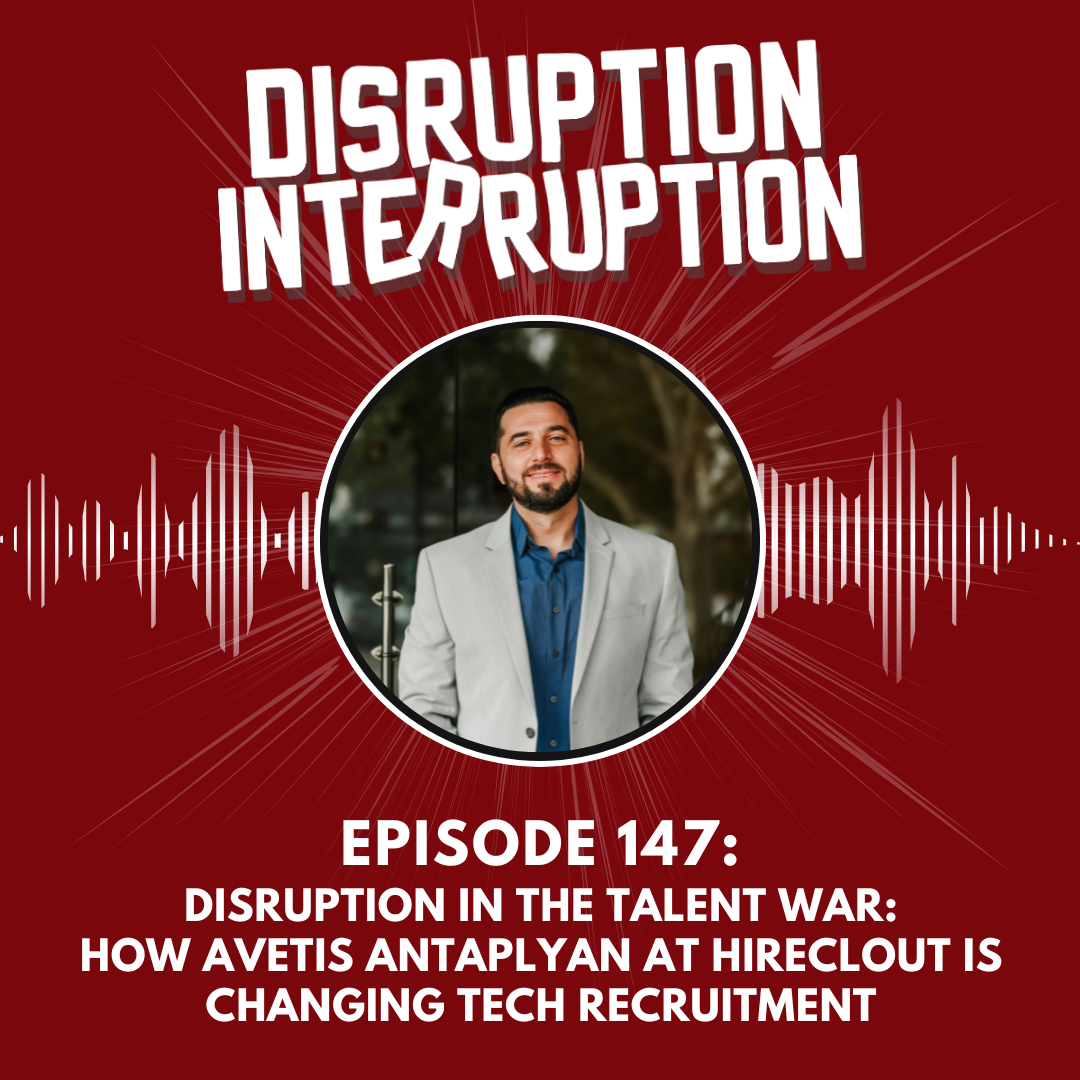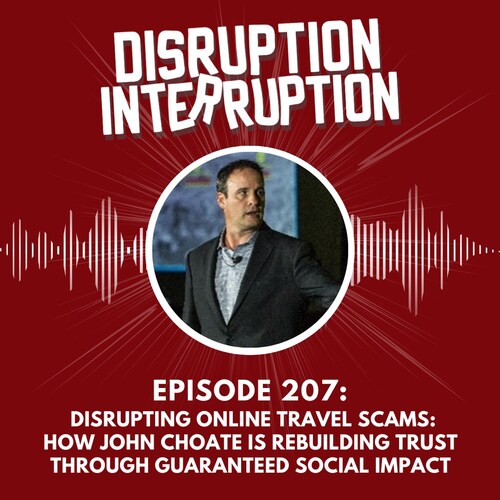Disrupting Job Recruitment by Building Recommendation Algorithms With David Kamwana
Disruption Interruption podcast host and veteran communications disruptor, Karla Jo Helms, interviews David Kamwana, Development Architect and Corporate Engineer with OneCrate — and learns how digitizing job matching can both improve hiring and clarify career path options for job seekers and students.
(Tampa Bay, FL) December 8. 2022 — Most job descriptions and resumes are on Word documents or PDFs and held on individual or business storage and then shared over limited databases for a limited time. This means that finding the ideal candidate or position requires checking the right database at the right moment. Meanwhile, job satisfaction is at a 20-year low, (1), and at least 44% of employees are actively seeking a new position. (2), Hiring managers struggle to find and attract the right talent and are paying more when they do.(3)
Enter “stabilizing” disruptor David Kamwana, Development Architect and Corporate Engineer with OneCrate, who explains to Karla Jo Helms, host of the Disruption Interruption podcast, that a digitized database of job descriptions and resumes can do more than make finding the right employment match much easier. It can begin to facilitate a more coherent pathway between university and vocational programs and businesses’ employment needs.
Born in Zambia, David Kamwana has been an inventor and engineer driven by a vision of a better world since childhood. He noticed several severe disconnects in the job market between the job descriptions created by Human Resources, companies’ access to available resumes and university programs that are meant to prepare students to start working. He said, "THAT’S IT — I’M DONE WITH THE STATUS QUO," and co-founded OneCrate with the vision of a comprehensive database of digitized job descriptions and resumes that will facilitate hiring and deliver vital job market statistics job seekers can use to plan their education and advance their careers.
Key takeaways:
- Most job descriptions and resumes are still written in word processors like Microsoft Word or Google Docs and held on a personal or business drive.
- It’s only when a job description is posted, and a job seeker actively searches in that location (a company website or job board) that a match is made.
- There could be an outstanding candidate with the right, but unless they happen upon the job description while it's posted, there is a disconnect. OneCrate looks to bridge that gap.
- Websites like Indeed are doing digital resumes, but there is a lot of dead information that an algorithm cannot accurately interpret.
- With enough data, we’ll be able to accurately assess the quantity of jobs in the market and compare that to the number of matching resumes. From that, we can make some pretty cool predictive models.
- Phase one for OneCrate, available right now, is using living online job descriptions and resumes to help companies and job seekers match up with our recommendation algorithm.
- Phase two will allow for what we call pathways. We will be able to create predictive pathways for anybody coming into the system.
- Right now, students are not fully informed about what the job market needs or even necessarily what their options are. Our database will be able to tell any job seeker what jobs are and will be in demand. This empowers them to make smarter decisions in the present.
- On the other side of the process, many Human Resources representatives may assume that a particular position is only suited to a degree holder when, in fact, there are other viable pathways.
- Microsoft, Facebook, and Amazon already have internship programs that allow you to join their programs out of high school. These internships often lead to positions paying a quarter of a million dollars a year. They already have that, so we already know it's possible.
- At OneCrate, we envision a future where job seekers and companies can see each other dynamically and where job seekers know exactly what steps to take to advance their careers.
Disruption Interruption is the podcast where you’ll hear from today’s biggest Industry Disruptors. Learn what motivated them to bring about change and how they overcame opposition to adoption.
Disruption Interruption can be listened to via the Podbean app and is available on Apple’s App Store and Google Play.
About Disruption Interruption:
Disruption is happening on an unprecedented scale, impacting all manner of industries — MedTech, Finance, IT, eCommerce, shipping, logistics, and more — and COVID has moved their timelines up a full decade or more. But WHO are these disruptors, and when did they say, “THAT’S IT! I’VE HAD IT!”? Time to Disrupt and Interrupt with host Karla Jo “KJ” Helms, veteran communications disruptor. KJ interviews bad a**es who are disrupting their industries and altering economic networks that have become antiquated with an establishment resistant to progress. She delves into uncovering secrets from industry rebels and quiet revolutionaries that uncover common traits — and not-so-common — that are changing our economic markets … and lives. Visit the world’s key pioneers that persist to success, despite arrows in their backs at www.disruptioninterruption.com.
About Karla Jo Helms:
Karla Jo Helms is the Chief Evangelist and Anti-PR(TM) Strategist for JOTO PR Disruptors(TM).
Karla Jo learned firsthand how unforgiving business can be when millions of dollars are on the line — and how the control of public opinion often determines whether one company is happily chosen, or another is brutally rejected. Being an alumni of crisis management, Karla Jo has worked with litigation attorneys, private investigators, and the media to help restore companies of goodwill back into the good graces of public opinion — Karla Jo operates on the ethic of getting it right the first time and not relying on second chances and doing what it takes to excel. Helms speaks globally on public relations, how the PR industry itself has lost its way and how, in the right hands, corporations can harness the power of Anti-PR to drive markets and impact market perception.
About David Kamwana:
David Kamwana is a mechanical engineer, product architect, and co-founder of OneCrate. He applies engineering principles to develop predictive models that influence the present. He is particularly interested in early decision-making regarding career paths and how the visibility of opportunity drives innovation.
OneCrate provides an Interactive Social Org Platform (ISOP) built on the foundation of company job portfolios. Businesses can upgrade to a relevant, easy-to-update org chart that can be viewed and interacted with by hiring managers and employees. Capabilities include editing job descriptions, viewing resumes, posting jobs, and more.
Join OneCrate to help millions make smarter data-driven career decisions. Find out more at https://www.onecrate.com/.
LinkedIn: https://www.linkedin.com/in/david-kamwana/
Company Website: https://www.onecrate.com/
References:
- Wooldridge, Scott. “Workplace satisfaction at a 20-year low: Survey.” BenefitsPRO.March 28, 2022: benefitspro.com/2022/03/28/workplace-satisfaction-at-a-20-year-low-survey/?slreturn=20221028131513.
- Iacurci, Greg. “The Great Resignation continues, as 44% of workers look for a new job.” CNBC, March 22, 2022, cnbc.com/2022/03/22/great-resignation-continues-as-44percent-of-workers-seek-a-new-job.html
- Guidance Talent. “Top 100 Hiring Statistics for 2022.” July 16, 2022. LinkedIn: linkedin.com/pulse/top-100-hiring-statistics-2022-rinku-thakkar/.
You May Also Like
These Related Stories

Disrupting the Talent War: How HIRECLOUT is Changing Tech Recruitment

Disrupting Travel's Billion-Dollar Blind Spot: John Choate Reclaims Value for Consumers


No Comments Yet
Let us know what you think